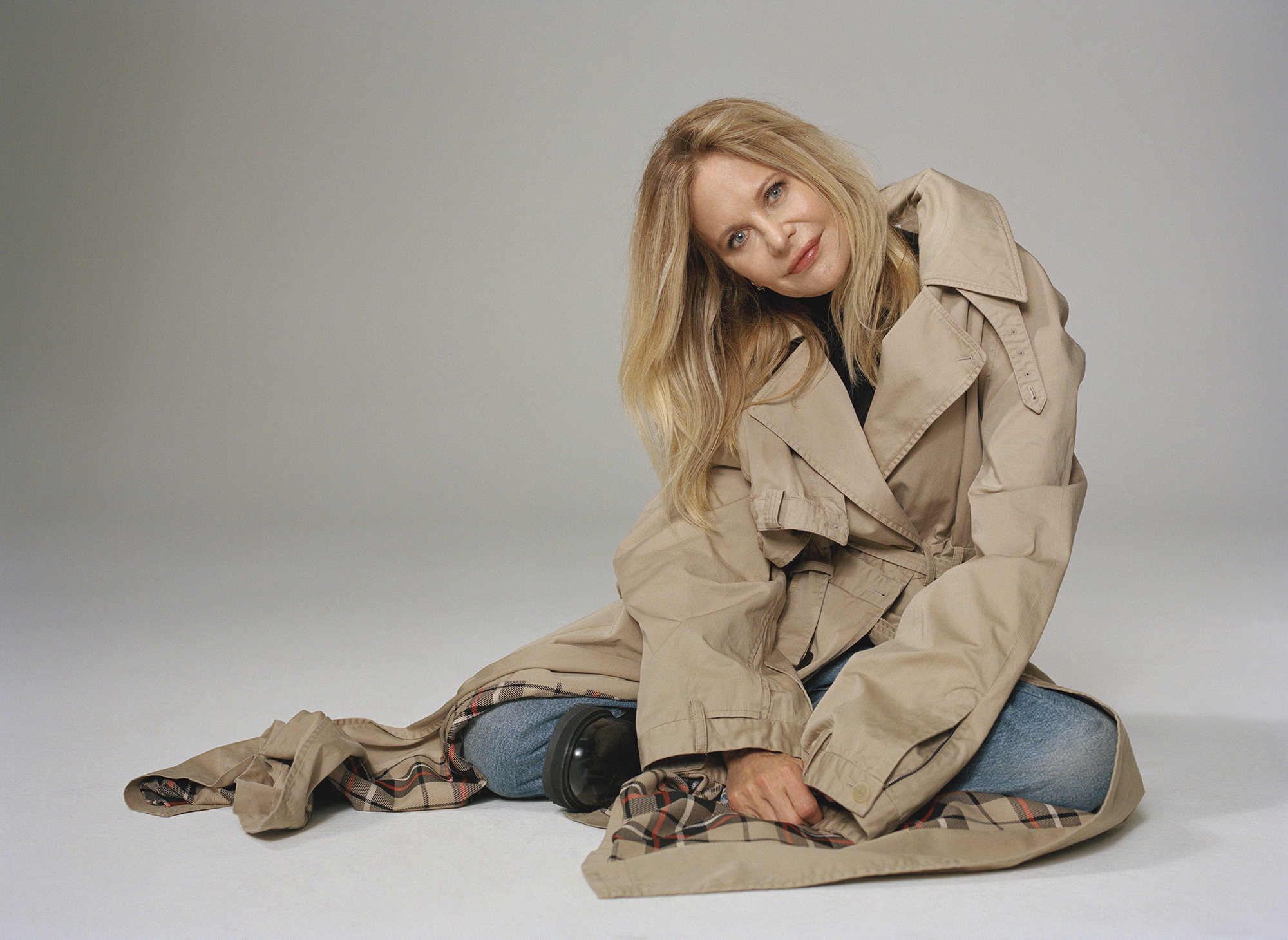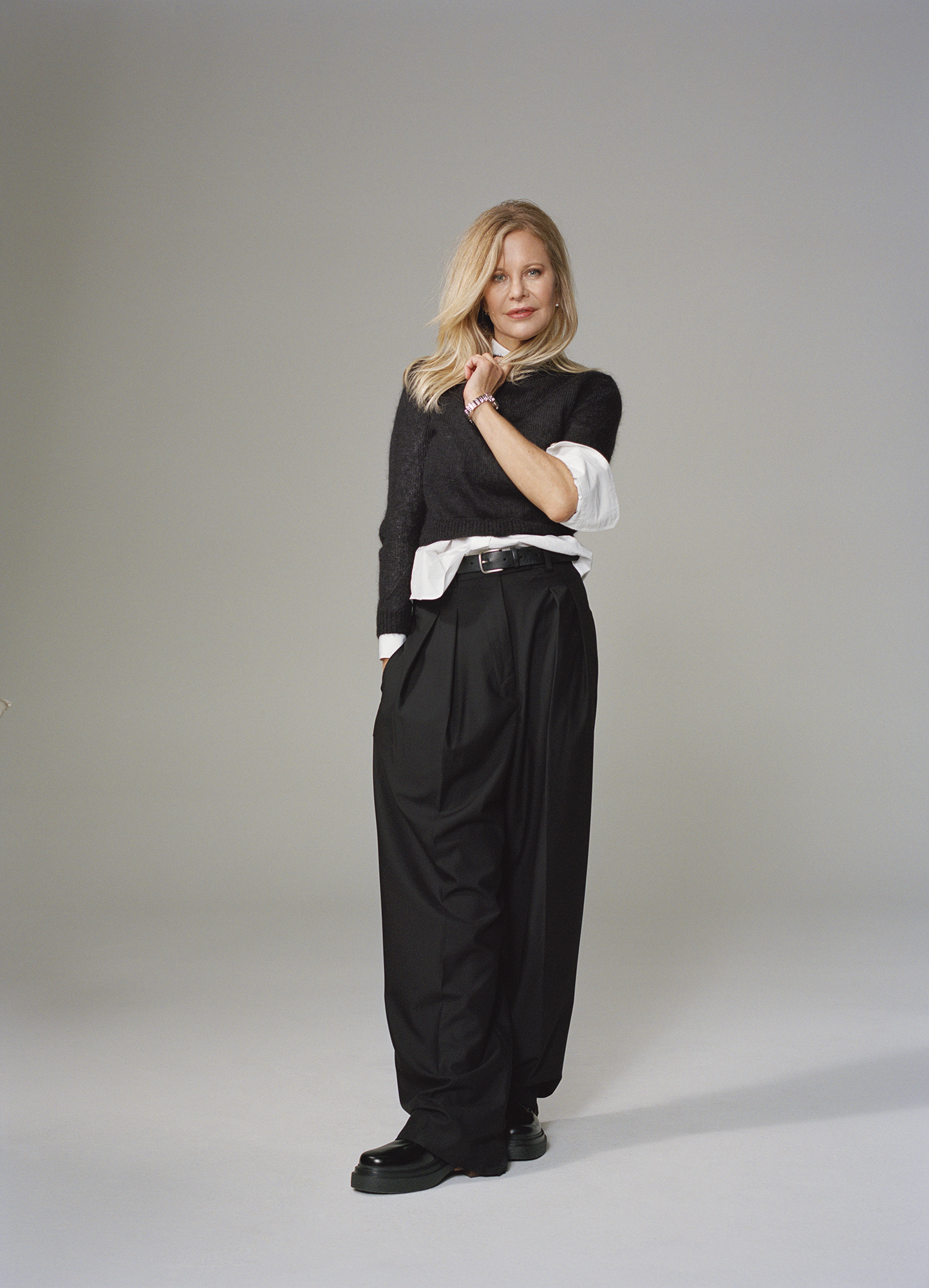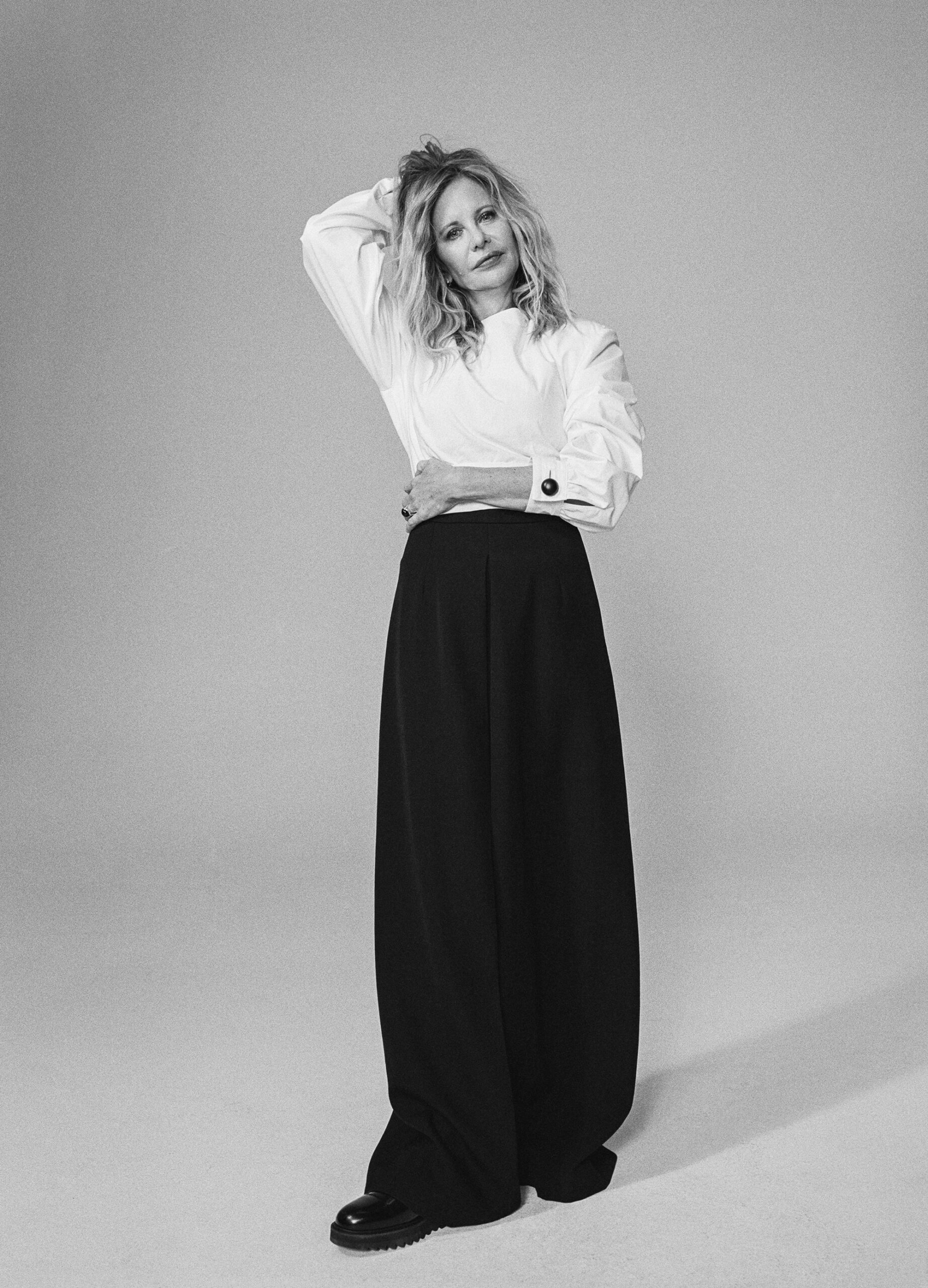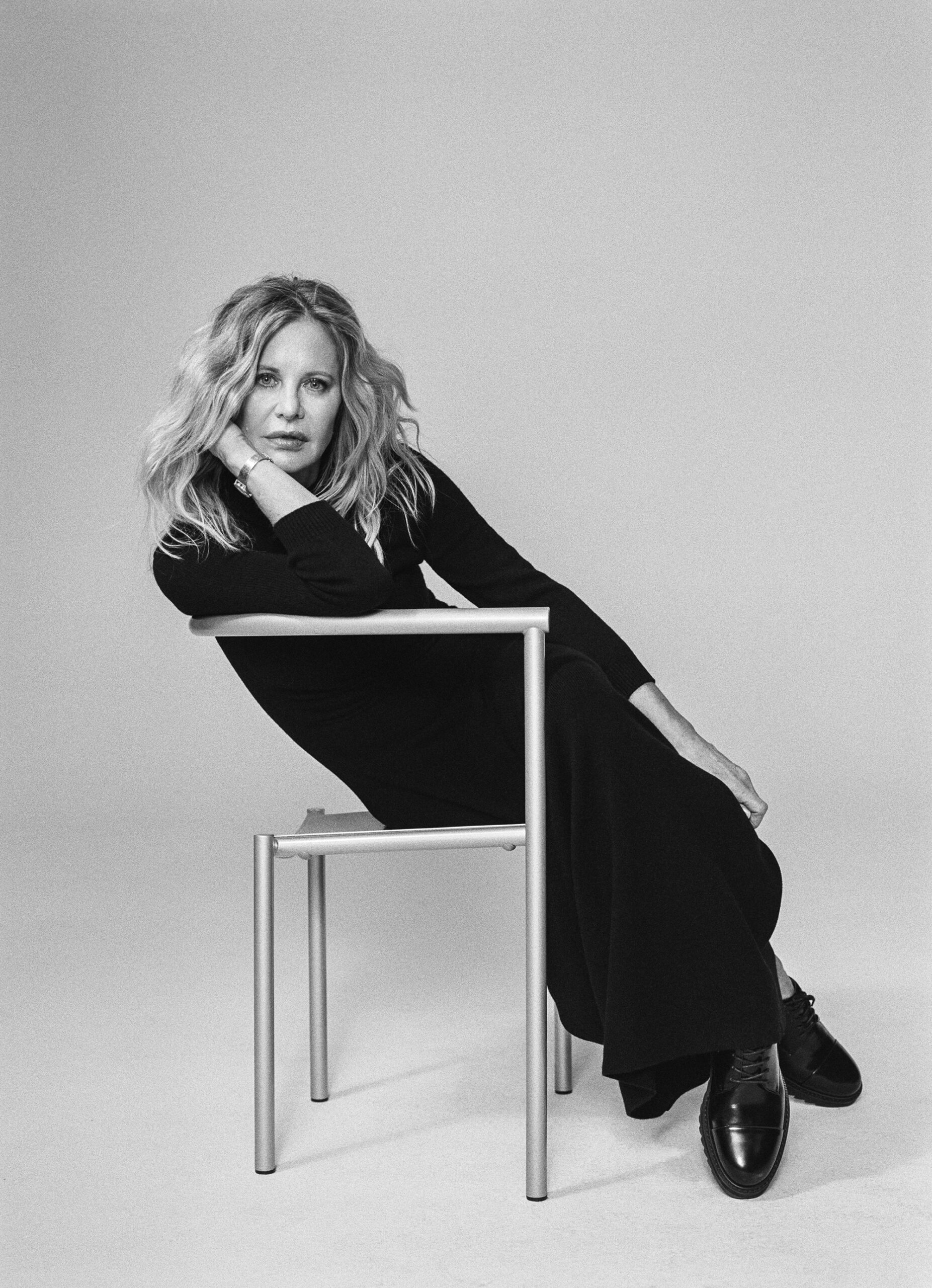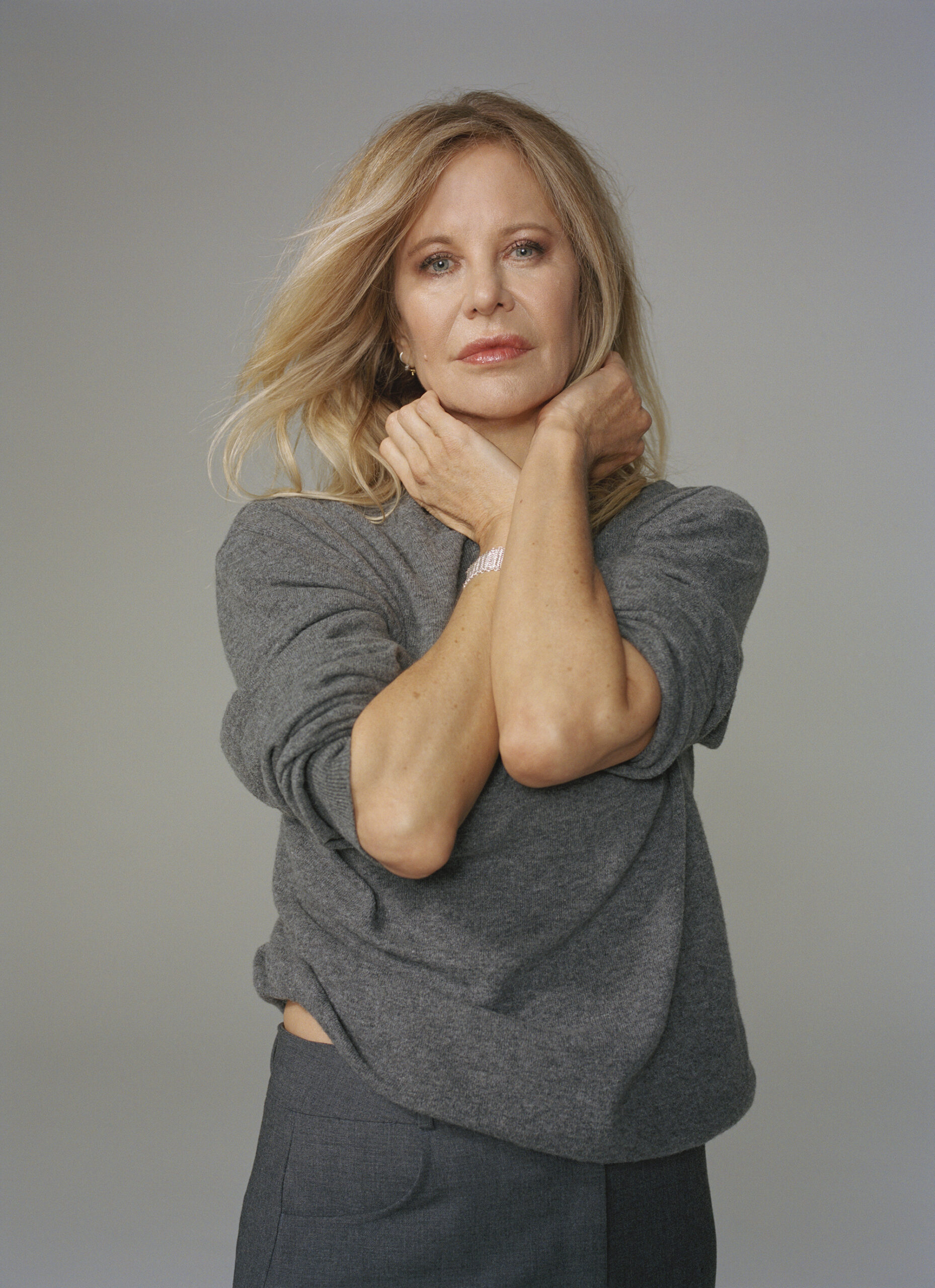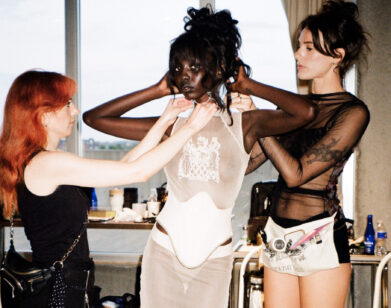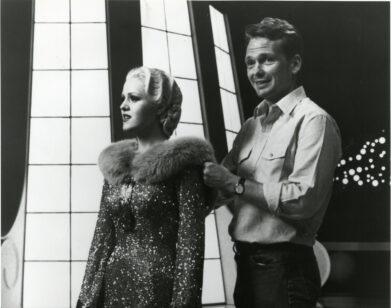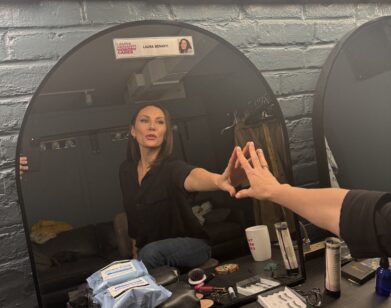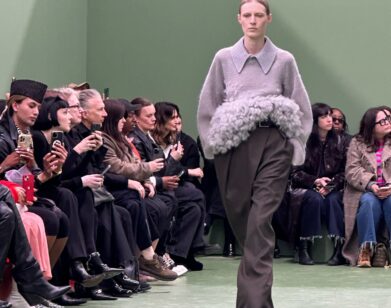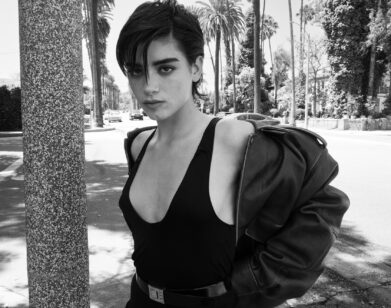ICON
Meg Ryan Talks To Carol Burnett About How to Run the Show
Meg Ryan, the undisputed queen of rom-coms, is back. After a short hiatus, the giver of the world’s most notorious fake orgasm has cowritten and directed What Happens Later, a comedy about two ex-lovers trapped in an airport, in which Ryan stars opposite Hollywood hunk David Duchovny. Here, the actor calls up her comedic hero Carol Burnett for a conversation about her life and career, but the last thing Meg Ryan wants to do is talk about Meg Ryan.
———
SUNDAY 1:56 PM JULY 9‚ 2023 LA
MEG RYAN: Hello?
CAROL BURNETT: Hi Meg, it’s Carol. How are you?
RYAN: I’m so good. This is what we’re doing instead of dinner.
BURNETT: Oh, right. How do we start?
RYAN: I don’t know.
SPEAKER 2: We’re already recording, so you’re free to start the conversation.
BURNETT: Meg, how many pictures have you directed?
RYAN: This was my second one.
BURNETT: I think you did a great job. The chemistry between you and David was absolute magic.
RYAN: Aw. Well, I didn’t really know him before. We’d only met a couple of times, maybe 20 years ago. But I remembered, more than all of his other amazing work like The X-Files and Californication, him on The Larry Sanders Show. He played himself as a guest and he was so absurd and funny.
BURNETT: For all these years.
RYAN: Yeah. He’s really smart and he’s such a unique kind of funny that we all thought he would be so perfect for Bill.
BURNETT: So you called him up or how did it come about?
RYAN: They sent him the script and then we Zoomed. The whole thing was happening during the—
BURNETT: Oh, the pandemic. Yeah.
RYAN: They sent me the script— which was a first or second draft by the playwright [Steven Dietz]—based on a play called Shooting Star. I had just moved to California at the beginning of the pandemic and it was this big collective pause, so that script got me thinking about what was happening in the world, how we were all kind of put under a glass. I started working on it and over the course of a year and a half, the script evolved and David came on. We got to know each other over these Zoom calls and some of those conversations found their way into the script, too.
BURNETT: I love the fact that you guys were so—I hate to say natural, but the way you would overlap is the way people interact in real life. Was a lot of that improvised?
RYAN: Some of it was, but because we had talked for about six months, we got super familiar with the script—but we both got off-book really quickly. [Laughs] Sometimes we talk now and we go, “How did we even make it seem like we know each other?”
BURNETT: How many takes do you do usually? Because some directors want to do a hundred and others are fine with two or three.
RYAN: We shot over the course of 21 nights and we did maybe three or four takes. Neither of us wanted to be up past 9:30 a.m.
BURNETT: [Laughs] Right.
RYAN: I think we were just tired. And Grotowski, the famous acting school, is all about wearing you out so you’re freer.
BURNETT: I don’t believe in that.
RYAN: [Laughs] It was a little bit that, but we liked being there together and we had a fantastic crew that we really trusted. It was as fun as it looks, which is something I wanted to ask you. Was The Carol Burnett Show as fun as it looked?
BURNETT: I think it was even more fun. [Laughs] I’ve been on some sitcoms as a guest where it’s 22 minutes of run-time and it takes five hours to tape, which is not necessary. We would tape for two hours and 15 minutes, and we had a studio audience there. I’m theater trained, so I never wanted to keep our studio audience waiting. So I would bet the stagehands that I could do a change of costume, wig, everything, before they could move a couch across the room. So the studio audience, in essence, were seeing a little mini Broadway musical comedy with all the costume changes and the music numbers and the sketches and the guest stars. And we’d be out in time to take our guest stars to dinner.
RYAN: Oh my gosh. How much did you rehearse?
BURNETT: We started on Monday and taped on Friday. But we knew what we were going to do and we knew how to do it because I started way back in the covered wagon days on The Garry Moore Show. [Laughs] He did it just like you would do a live show and that’s what we did. The only reason we didn’t go even shorter was because we had to move the scenery in and out of the hall at CBS Television City.
RYAN: Wow.
BURNETT: Even the sound effects were live.
RYAN: Wait a minute. Even in “As the Stomach Turns” [a sketch from The Carol Burnett Show]?
BURNETT: Yep. Whenever you’d hear a body fall, that was our sound effects man making that happen— like in old radio shows.
RYAN: Wow.
BURNETT: And he was so sharp.
RYAN: [Laughs] What I loved about “As the Stomach Turns,” because I did As the World Turns, was that you guys got it so right. The misplaced cues. They were just hilarious.
BURNETT: [Laughs] People say that we always broke up, but it was not that often. People just remember it because it was kind of delicious. And it was usually Tim Conway’s fault because he would be coming up with stuff that we never practiced in rehearsal.
RYAN: I don’t know how you did that. When I look at all the things of yours that I love, I realize they have a common thread, which is that the basic intent is to entertain. The outward-facing generosity is consistent through all of it. And sometimes that’s forgotten in other things, but never with you, Carol.
BURNETT: I really appreciate it. I want to thank you for so many wonderful moments in your movies, and the famous orgasm scene. You can’t top that. Did you do it more than once?
RYAN: Oh, we probably did that over and over and over again.
BURNETT: Really?
RYAN: Yeah. It’s funny, my son just called me this morning and he’s in New York staying at a hotel that’s right across the street from Katz’s Deli. My daughter was here and everybody was on speaker, and they were like, “Mom, this is a very unique embarrassment.” [Laughs] He said, “You know you can go into that deli and there’s an arrow pointing down to the table where you shot that scene.”
BURNETT: Oh, god. [Laughs]
RYAN: I wonder if it’s the right one.
BURNETT: I love the moments that you’ve had with your costars, you and Billy [Crystal] and now with David. You made me cry a little bit, too.
RYAN: We did? Aw.
BURNETT: Yeah. I was very touched by—I don’t want to spoil anything.
RYAN: The story started to revolve around this question of how we begin to forgive ourselves and one another. It’s a rom-com, so a lot of times you have to ask those deeper questions in secret and hope that people can feel them underneath everything.
BURNETT: Definitely. And I love the way you shot it, too.
RYAN: We shot in a purple part of Arkansas at the Crystal Bridges Museum of American Art. It’s fantastic because it’s in the middle of the country and it’s free for anyone who wants to go. It’s the third most endowed art museum in the country, after the Art Institute of Chicago.
BURNETT: Oh, wow.
RYAN: They let us use it at night. And then during the day, they had the parts of the set that we couldn’t take down as part of an exhibit— like, “This is what a set looks like.” They even turned art into art.
BURNETT: That’s great.
RYAN: Yeah.
BURNETT: My mother and my grandmother were born in Arkansas.
RYAN: What part?
BURNETT: A little one-horse town called Belleville. But then we migrated to Texas.
RYAN: What part of [the Carol Burnett Show character] Mama’s family comes from there? [Laughs]
BURNETT: A lot of Eunice [Higgins, the daughter of Mama], came from my mother because she had all these dreams, but they never came true, so she was always very frustrated. We were going to get an older actress to play Mama, but we didn’t know we were going to do it more than once, so Bob Mackie said, “Oh, let’s just put a wig on Vicki [Lawrence] and put her in a fat suit and stick glasses on her and let Vicki be Mama.” And that’s how that happened.
RYAN: Did she improv a lot of that? Because it seemed like you were always so surprised by her.
BURNETT: Actually, I hired her when she was 17 years old.
RYAN: Oh my god.
BURNETT: She was just graduating from high school and she wrote me a fan letter. And in it, she included a photograph of herself in her local newspaper talking about how she was going to be in a contest for the title role of Miss Fireball of Inglewood. [Laughs] It so happened that we were going to start my show, and we were thinking about doing a recurring sketch with Harvey [Korman] and me where we’re a married couple raising my kid sister. So I looked at the photograph and Vicki looked very much like me when I was 17.
RYAN: Wow.
BURNETT: I called her up and said, “Could we come and see you in the Miss Fireball contest?” We went to see her and she won the contest. I went backstage and said, “I’m going to be in touch with you.” So that following summer we got ahold of her and did a little test. By then, she was 18 and we hired her. She had no experience, really. Today, no network would let me do that.
RYAN: Wow.
BURNETT: [Laughs] I love it, she started off playing my kid sister and wound up being my Mama. And I’m 14 years older than she is.
RYAN: Whoa. And Mama was nothing but confidence, huh?
BURNETT: Oh, gosh, yes. When I first read that script, it was written by a team, Dick Clair and Jenna McMahon, and it was, to me, right out of Tennessee Williams.
RYAN: What was that writers’ room like? How many people?
BURNETT: We had about nine writers, three women. And then we had special material writers who would do the music. And then we had a choreographer, 12 dancers, and two guest stars a week. And Bob Mackie designed 65 to 70 costumes a week.
RYAN: I can’t even comprehend that.
BURNETT: In 11 years, that comes to about 17,000 costumes. He’s amazing.
RYAN: Is the “Went with the Wind” costume the only one in the Smithsonian?
BURNETT: Yes. And that was all Bob. He came up with that idea.
RYAN: Unbelievable.
BURNETT: I loved what you wore in the movie.
RYAN: Oh, thanks. It’s very simple. Just two black-and-white characters. And I love how it turns out, by the end of the movie, that they almost look like they’re in their pajamas. They’re so innocent in their white outfits. It was all really deliberate. We had a $3 million budget. [Laughs]
BURNETT: Oh my god.
RYAN: We had to do it really quickly. A lot of those extras weren’t even ours, they were real people. We went back in post and made everybody the same palette. There’s a lot of stuff you can do digitally now, thank god.
BURNETT: Do you have a preference for being in front of the camera or behind it?
RYAN: Truly, the easiest part was acting in it. I want to direct again just so I can sit in the chair, because I’m sure there’s a lot of things I missed. I hadn’t done a role in a really long time, but it was fun with David. A lot of it was done in two shots. I’m proud of that. I set up everything beforehand so that once we were there, it was just David and I trying to tell the truth.
BURNETT: Well, it sure comes across, sweetheart.
RYAN: Aw, that’s nice, Carol. I have to ask you this: Did you know when you were doing the show that you were breaking boundaries as a woman?
BURNETT: I never thought of it. It was just the next step for me after I did The Garry Moore Show. Originally, I wanted to be on Broadway in musicals like Annie Get Your Gun and Mame and Gypsy. I never really thought of television at all. I didn’t grow up with it. But when I started doing Garry’s show, I was doing different characters and different songs each week. And I started to like the challenge.
RYAN: Right.
BURNETT: I learned so much from Garry that when the opportunity came for me to do a variety show, it was just normal. I was going from one show where I was the second banana to another show where I was the first banana, and that was it.
RYAN: [Laughs]
BURNETT: It didn’t occur to me that I was breaking any boundaries or anything like that. But the network tried to talk me out of it. They said, “Carol, comedy variety is a man’s game.”
RYAN: Oh, come on.
BURNETT: They said, “It’s Jackie Gleason. It’s [Sid] Caesar. Now it’s Dean Martin.” They said, “It’s not for you gals.” Can you believe that?
RYAN: No.
BURNETT: They wanted me to do a half-hour sitcom. And I said, “I don’t want to be the same person every week. I want to be different people. I want to have music.” So that’s what we got.
RYAN: Just buckle up, buckle down, and get it done. Right?
BURNETT: With time to go out to dinner. [Laughs]
RYAN: I love that so much. My motivation for the movie was just, “Can we get out before the sun rises?” [Laughs]
BURNETT: Bless your heart. So you slept all day?
RYAN: We tried. We’d go to bed around 4:30 or 5. Then we got back to work around 4 the next day.
BURNETT: Wow.
RYAN: So, time for a bike ride and to answer all the questions, set everything up, and then go to work.
BURNETT: Yeah.
RYAN: I’m very scrappy and I really like to buckle down. That’s what I like about directing: You’re involved with all the artists, the sound people, the visual people, production. And you learn everything. On my first movie [2015’s Ithaca], I was listening back to one scene with the sound guy, and I was like, “Ron, it really feels like there’s a superabundance of birds.” And he goes, “Well, in 1944, there were 60 percent more birds in North America.” [Laughs]
BURNETT: That’s wild.
RYAN: So it was always that kind of thing. Sam Shepard was in my first movie, and I loved being in on his process—and Hamish Linklater. David, a little less so, because I was his costar more than his director. He didn’t need a director.
BURNETT: So you hired David because you knew he could deliver without having to give him much direction?
RYAN: Of course.
BURNETT: When I did Annie, John Huston was the director, and I was nervous about the first scene. I went to him and said, “How do you see me doing this first scene with Ann Reinking?” And he looked at me and he said, “Just cavort, dear.” [Laughs]
RYAN: He totally trusted you.
BURNETT: That’s it. He always said, “A lot of it is in the casting.” And Robert Altman was that way, too. He would say, “You can rein them in a little bit or say, ‘Give me a little more of that.’” But if you cast correctly, you’re halfway there, if not more so.
RYAN: Exactly. There’s an essence that I could trust in David. And he has a real facility with language because of the kind of novelist that he is. He’s a really great novelist.
BURNETT: Wow. I didn’t know that.
RYAN: Yeah. He has a book called Truly Like Lightning. He’s a profound person and I have a lot of respect for him. And he’s fun on top of it.
BURNETT: My daughter Carrie did an episode of The X-Files.
RYAN: Oh!
BURNETT: I’m sure he remembers her. It was one that was written by [Breaking Bad creator] Vince Gilligan. I’ve never met him, but please give him my love and tell him I think he’s so wonderful in this movie with you. The two of you are just magic.
RYAN: Oh, I’m definitely going to let him know. And maybe you and Brian [Miller, Burnett’s husband] and I can have dinner when we get back after summer.
BURNETT: Absolutely. We’d love it.
RYAN: Thank you again for watching the film and doing this interview with me, Carol.
BURNETT: Well, thank you for doing it. [Laughs] I wish you all the best with it, Meg. You deserve it.
RYAN: We’ll see each other soon, I hope.
BURNETT: I hope so too, sweetheart.
This interview and photo shoot was completed before the SAG-AFTRA strike.
———
Hair: Rikke Gajda using Unite and T3 at The Wall Group
Makeup: Adam Breuchaud using Tom Ford at Forward Artists
Nails: Kimmie Kyees using Dior Vernis at The Wall Group
Photography Assistants: Michael Irwin and Austin Calvello
Fashion Assistant: Dre Romero
Production Coordination: Gabriel Bruce

